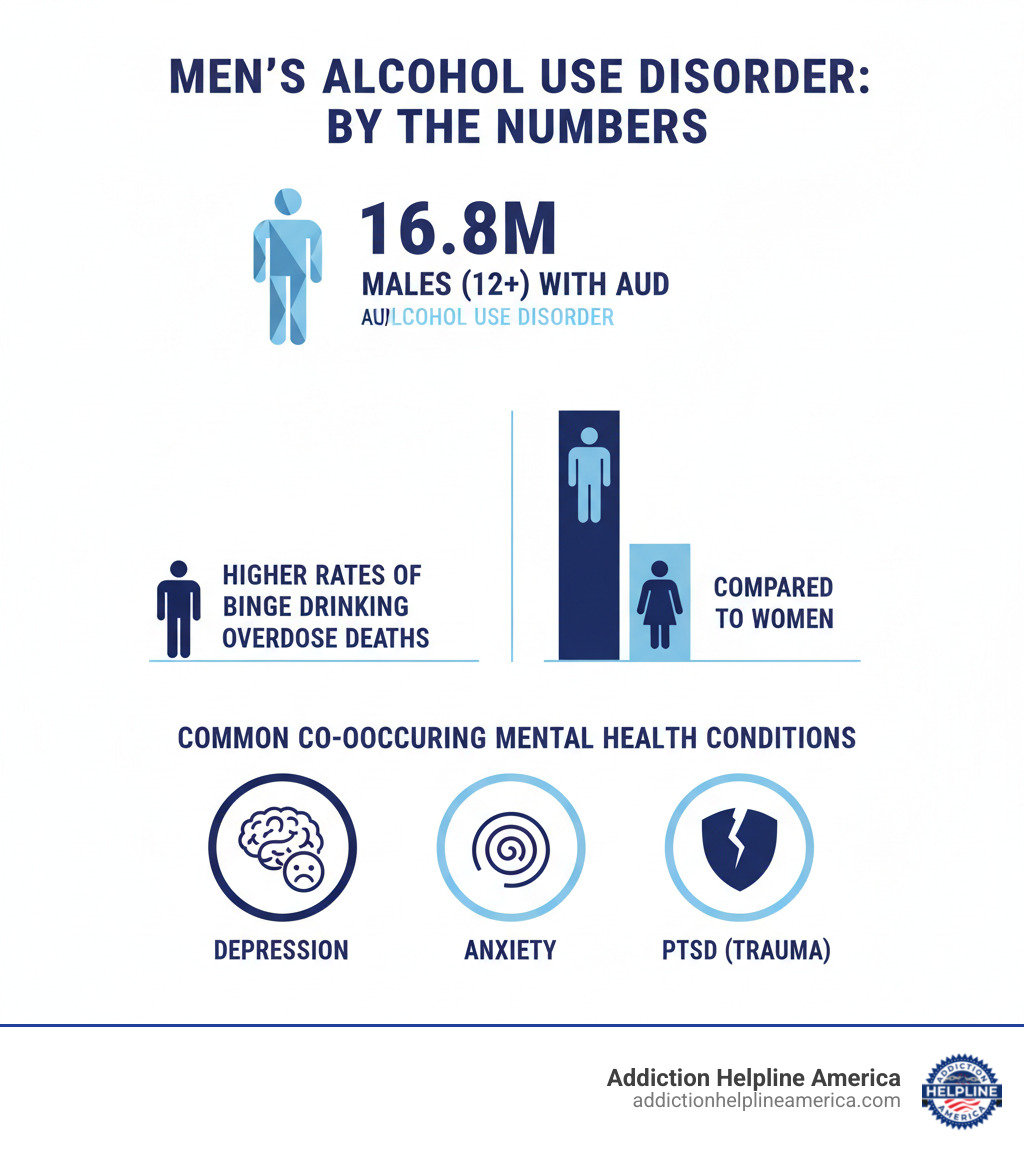
Understanding the Path to Men’s Alcohol Rehab
If you’re struggling with alcohol addiction, you’re not alone. The decision to seek help isn’t a sign of weakness—it’s an act of courage. Men face unique pressures regarding addiction, from societal expectations to the stigma around asking for help. This can make the journey to sobriety feel impossible, but recovery is achievable.
Men’s alcohol rehab programs offer specialized treatment designed for the unique challenges men face. These gender-specific programs create safe spaces where men can be honest about their struggles, rebuild their sense of purpose, and develop tools for lasting sobriety.
What Makes Men’s Alcohol Rehab Different:
- Gender-specific therapy addressing societal pressures and masculinity.
- Safe environments for men to express vulnerability without judgment.
- Custom treatment for co-occurring issues like aggression, trauma, and depression.
- Brotherhood and peer support to combat isolation and shame.
Key Statistics:
- In 2023, approximately 16.8 million males ages 12+ had an alcohol use disorder, compared to 12 million females.
- Men are more likely to drink excessively and experience alcohol-related injuries.
At Addiction Helpline America, we connect men and their families to quality alcohol rehab programs that understand these unique needs. Our team provides compassionate, confidential guidance 24/7 to help you find the right program for your situation.
Easy men’s alcohol rehab glossary:
Why Gender-Specific Rehab is Crucial for Men
From childhood, men often hear messages like: be strong, don’t cry, handle it yourself. These expectations shape how men approach addiction, making it feel like a personal failure to admit they need help. The numbers tell a sobering story: approximately 16.8 million males ages 12 and older struggled with alcohol use disorder in 2023, compared to 12 million females. Men drink more heavily and die from alcohol-related causes at higher rates, yet are less likely to seek professional help.
This is where men’s alcohol rehab programs make a difference. They create spaces where the armor can come off—where strength means being honest. Surrounded by other men on the same path, shame and isolation begin to break apart. In men-only treatment, you’re part of a brotherhood where you can safely discuss pressures, anger, and fear. We’ve watched countless men find their voice in these programs, learning that asking for help is the bravest thing they can do. If you’re ready to explore men-only treatment, men’s residential treatment offers intensive support in a dedicated environment.
The Unique Challenges Men Face with Alcohol Addiction
Men don’t just drink differently—they struggle differently. Societal messages shape how addiction takes root.
- High-Risk Behavior: Men often engage in behaviors like drunk driving or mixing substances, which can accelerate addiction and lead to legal or physical consequences, compounding shame.
- Aggression and Anger: Men with alcohol problems are more likely to struggle with irritability or violent outbursts. This anger often masks deeper issues like depression, which in men can manifest as rage or numbness rather than sadness.
- Reluctance to Seek Help: Masculine norms create intense shame around admitting a problem. Many men feel like asking for help means they’ve failed as a man, father, or provider, causing them to suffer in silence.
- Different Relapse Triggers: Men often face unique pressures around work, financial stress, or feelings of letting their family down, which can be powerful relapse triggers.
Key Benefits of a Men-Only Environment
A men-only rehab provides a unique atmosphere for healing.
- A Safe Space for Vulnerability: Without the need to maintain a facade, men can be honest about their fears and pain. In mixed-gender settings, these walls often stay up, but in men’s alcohol rehab, they can come down.
- Reduced Distractions: Without social or romantic tensions, men can focus their energy entirely on healing. There’s no posturing, just men doing the hard work of recovery together.
- Custom Communication Styles: Therapists in gender-specific programs understand how to reach men who suppress feelings, creating conversations that feel natural and help develop healthy communication skills.
- Accountability and Peer Support: Peer accountability from men who understand the struggle is powerful. The friendships built in men-only treatment combat isolation and often become a lifelong support network.
Core Components of a Quality Men’s Alcohol Rehab Program
An effective men’s alcohol rehab program doesn’t just focus on stopping drinking—it addresses your overall health to create a foundation for lasting change.
For many, the journey starts with medical detoxification. Stopping alcohol abruptly after prolonged heavy use can cause dangerous withdrawal symptoms. Medically supervised detox provides 24/7 monitoring and medication to manage symptoms safely, allowing your body to stabilize before the deeper work of recovery begins.
After detox, the focus shifts to an individualized treatment plan. A quality program assesses your unique drinking patterns, mental health needs, and personal goals to create a roadmap designed specifically for you. The best programs also incorporate holistic approaches that treat the whole person. This includes:
- Physical Wellness: Regular exercise improves physical health, reduces stress, and helps rebuild confidence. Quality programs offer fitness facilities and structured exercise.
- Nutritional Guidance: Proper nutrition helps repair the damage alcohol has done to the body, stabilizing mood and boosting energy.
Understanding the different settings is key to choosing the right care:
| Feature | Inpatient/Residential Rehab | Outpatient Rehab |
|---|---|---|
| Duration | 28 days to several months | Varies (weeks to months) |
| Intensity | High (24/7 care and support) | Low to Medium (flexible scheduling) |
| Living Situation | On-site in a treatment facility | At home |
| Ideal Candidate | Men with severe AUD, co-occurring mental health disorders, unstable home environments, or those requiring medical supervision | Men with moderate AUD, stable home environments, strong sober support, or as a step-down from inpatient care |
Inpatient or residential rehab provides the most intensive, 24/7 care in an immersive environment free from daily triggers. It’s ideal for men with severe addiction or those needing a supportive setting. For more details, explore men’s residential treatment. Outpatient programs offer flexibility, allowing you to live at home while attending treatment. This works well for men with moderate addiction and a stable home life.
Evidence-Based Therapies Custom for Men
Quality men’s alcohol rehab programs adapt proven therapies to resonate with how men process emotions and communicate.
- Cognitive Behavioral Therapy (CBT): This practical approach helps you identify and challenge negative thought patterns that fuel drinking, replacing them with healthier coping strategies.
- Motivational Interviewing (MI): A collaborative, non-confrontational approach that helps men explore their own reasons for change and build internal motivation, respecting their autonomy.
- Anger Management: This therapy helps men understand the root of their anger, recognize triggers, and develop healthy ways to manage intense emotions.
- Trauma-Informed Care: Creates a safe environment to process past trauma through a lens that understands masculine experiences, emphasizing resilience and strength.
- Group and Individual Counseling: Individual therapy offers a private space for deep personal work, while gender-specific group therapy provides brotherhood, peer feedback, and the realization that you are not alone. These group bonds often become a lifelong support network.
To explore more about these approaches, we encourage you to learn more about substance abuse recovery.
Addressing Co-Occurring Mental Health Disorders
Alcohol addiction rarely exists in a vacuum. For most men, it’s tangled with co-occurring disorders (or a dual diagnosis). For men, these challenges often manifest differently. Depression may appear as irritability or anger, while anxiety disorders and Post-Traumatic Stress Disorder (PTSD) are also common. Some men also struggle with alexithymia—difficulty identifying and expressing emotions.
A high-quality men’s alcohol rehab program uses an integrated care approach, treating addiction and mental health conditions simultaneously. This may include medication management, specialized trauma therapy like EMDR, and counseling to develop healthier coping mechanisms. Addressing these underlying issues is key to achieving not just sobriety, but genuine, lasting healing.
How to Choose the Right Men’s Alcohol Rehab
Finding the right men’s alcohol rehab is a critical step. It’s about finding a place where you feel safe, understood, and equipped to rebuild your life. Here’s what to look for:
- Accreditation: Look for accreditation from organizations like the Commission on Accreditation of Rehabilitation Facilities (CARF) or the Joint Commission. This is your assurance that the facility meets strict standards for safety and quality care.
- Staff Credentials: A quality program will have licensed counselors, medical doctors, and therapists with real experience working with men and understanding their unique challenges.
- Treatment Philosophy: Some centers follow a 12-step approach, while others focus on cognitive therapies or holistic healing. We can help you find a philosophy that aligns with your beliefs.
- Location and Environment: Consider whether you’d thrive in a quiet, rural setting or a more connected urban center. A comfortable space is a practical tool for recovery.
- Family Program Availability: Addiction impacts the whole family. Programs that include family therapy and education can help repair damaged connections and build a stronger support system.
Evaluating Different Levels of Care for Men’s Alcohol Rehab
Recovery isn’t one-size-fits-all. Different stages of your journey require different levels of support.
- Medically Supervised Detox: The necessary first step for many, providing 24/7 monitoring and medication to safely manage alcohol withdrawal.
- Men’s Inpatient Rehab: Also called residential treatment, this offers the most intensive care. You live at the facility, immersed in a structured, trigger-free environment. It’s best for men with severe AUD or unsupportive home situations.
- Partial Hospitalization Programs (PHP): A step-down from inpatient, you attend treatment during the day (e.g., 6 hours/day, 5 days/week) and return home at night.
- Intensive Outpatient Programs (IOP): Offers structured therapy (e.g., 3-5 times/week for 9+ hours total) with more flexibility, allowing you to maintain work or family duties.
- Sober Living Options: These transitional homes provide a drug-free environment where you live with other men in recovery, practicing sober living skills.
Our team can help you determine which level of care is right for your unique situation.
Key Questions to Ask an Admissions Advisor
When speaking with an admissions advisor, being prepared with questions is key. This is about your future and your recovery.
- What therapies are specifically used for men?
- What is the client-to-staff ratio?
- How is family involvement handled?
- What are the aftercare and relapse prevention plans?
- How is progress measured and the treatment plan adjusted?
These questions provide real insight into a program’s quality. Our admissions navigators at Addiction Helpline America are here to help you ask these questions and find a facility that genuinely meets your needs.
Building a Foundation for Lifelong Sobriety
Completing a men’s alcohol rehab program is about starting a new life. The changes that begin in treatment can ripple through every part of your existence.
You’ll notice physical changes like better sleep and clearer thinking, but the mental health improvements run deeper. By addressing the depression, anger, or trauma you’ve been masking with alcohol, you develop real emotional stability. One of the most meaningful outcomes is restored relationships. The communication skills learned in rehab help you rebuild trust with partners, children, and friends.
Perhaps the most profound shift is finding a renewed sense of purpose. Recovery helps you refind your core values and set meaningful goals, whether in your career, community, or as a father and partner. These positive outcomes require commitment and a solid plan. For those seeking additional resources, organizations like the Delaware Division of Substance Abuse and Mental Health offer state-level support.
The Critical Role of Aftercare and Ongoing Support
Graduating from rehab is the starting line. The real work of staying sober happens in the months and years that follow, making aftercare and ongoing support essential.
- Relapse Prevention Plan: A personalized roadmap to help you recognize your unique triggers and equip you with techniques to handle them without drinking.
- Alumni Programs: Staying connected to the people you were in treatment with provides ongoing accountability and reminds you that you’re not alone.
- Continued Therapy: A therapist can help you process new challenges, reinforce coping skills, and spot warning signs before they become serious problems.
- Sober Living Arrangements: These transitional homes offer a structured, supportive environment as you reintegrate into daily life. We can help coordinate these options.
- Sober Social Network: Building friendships based on honesty and mutual support, rather than drinking, is a critical part of long-term recovery.
Community and Peer Support in Men’s Alcohol Rehab
Men’s alcohol rehab programs emphasize community because shared experience has a unique power to heal. Connecting with others who understand is life-changing for men who have been isolating for years.
Accountability partners and brotherhood create a constructive environment where you can be honest without judgment. In 12-Step programs, sponsorship provides a personal mentor who has walked the path and can guide you. Peer-led support meetings like Alcoholics Anonymous offer a room full of people who simply “get it.”
Recovery teaches you how to build healthy friendships based on trust and mutual support. The power of shared experience is what ties this all together. Realizing you are not uniquely broken or alone provides the collective strength that becomes a cornerstone of lasting recovery.
Frequently Asked Questions about Men’s Alcohol Rehab
We know that seeking help for alcohol addiction brings up many questions. Here are answers to some of the most common inquiries about men’s alcohol rehab.
How long does men’s alcohol rehab usually last?
The duration of men’s alcohol rehab varies based on individual needs. There is no one-size-fits-all timeline, but here’s a general breakdown:
- Detoxification: 3 to 7 days to manage withdrawal safely.
- Inpatient/Residential Rehab: 28 to 45 days is common, but long-term options can last 120 days or more.
- Partial Hospitalization (PHP): Intensive day treatment lasting several weeks.
- Intensive Outpatient (IOP): Flexible treatment for several months, typically 9+ hours per week.
- Standard Outpatient: Often weekly sessions used as a step-down from more intensive care.
Will my insurance cover men’s alcohol rehab?
Most reputable men’s alcohol rehab centers accept private or state-funded insurance. Due to mental health parity laws, addiction treatment is often covered like other medical conditions. However, coverage varies by plan and facility.
At Addiction Helpline America, we offer free, confidential assistance to verify your insurance benefits and explain any out-of-pocket costs. Payment plans or sliding fee scales are also often available, so don’t let financial concerns stop you from seeking help.
What makes men’s rehab different from co-ed programs?
The primary difference is the custom approach to men’s unique challenges. Men’s alcohol rehab offers distinct advantages:
- Safe Space for Vulnerability: Men often feel more comfortable expressing emotions in an all-male environment, free from the pressure to appear “strong.”
- Reduced Distractions: An all-male setting minimizes social or romantic distractions, allowing for a singular focus on healing.
- Custom Therapy: Programs can specifically address issues like anger management, the impact of traditional masculinity, and male-specific trauma.
- Brotherhood and Peer Support: Fosters a powerful sense of camaraderie and accountability among men with shared life experiences.
Conclusion: Take the First Step Towards a New Life
For men, the weight of societal expectations and the pressure to appear strong can make reaching out for help with alcohol addiction feel impossible. But seeking help isn’t weakness. It’s the bravest thing you can do.
As we’ve explored, men’s alcohol rehab programs are uniquely designed to address these challenges. They provide a space where brotherhood replaces isolation, where therapies are custom to how men communicate, and where you can rebuild your life with a renewed sense of purpose. The benefits are real: improved health, restored relationships, and a genuine identity beyond addiction.
Recovery is a journey, not a destination. It requires ongoing support through aftercare, alumni networks, and the sober friendships you’ll build. You don’t have to walk this path alone.
At Addiction Helpline America, we specialize in connecting men like you to the right treatment programs. We understand the landscape, we can verify your insurance, and we know that every man’s path is different. Our team provides free, confidential, personalized guidance 24/7 to help you find the program that fits your specific needs.
Your new life is waiting—a life of clarity, connection, and meaning. It starts with one courageous decision to ask for help. We’re here to listen without judgment and guide you toward the right men’s alcohol rehab program.
Our helpline is 100%
free & confidential
If you or someone you care about is struggling with drug or alcohol addiction, we can help you explore your recovery options. Don’t face this challenge alone—seek support from us.
Programs
Resources
Will my insurance
cover addiction
treatment?
We're ready to help
Find the best
drug or alcohol treatment
center
Are you or a loved one struggling with addiction? Call today to speak to a treatment expert.
















